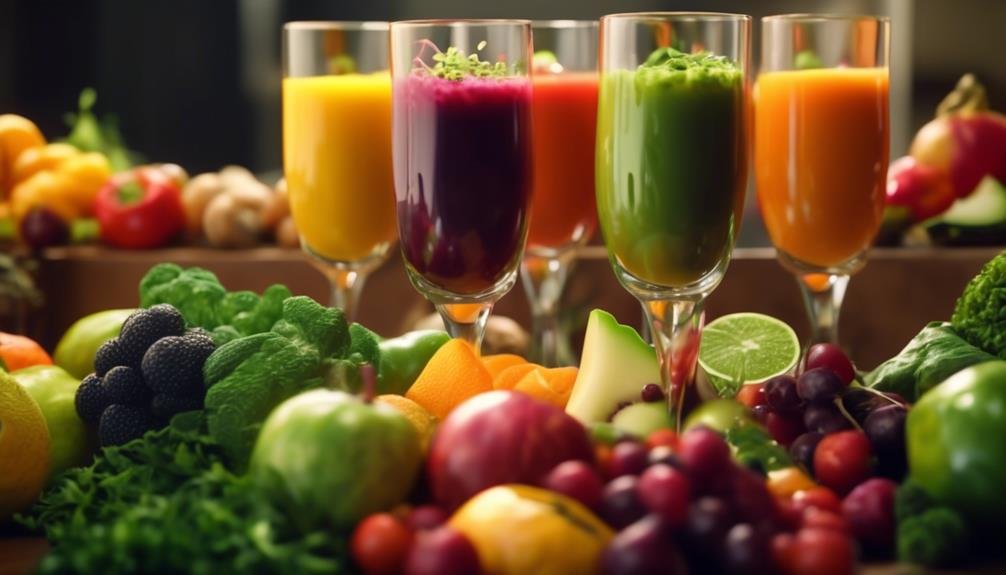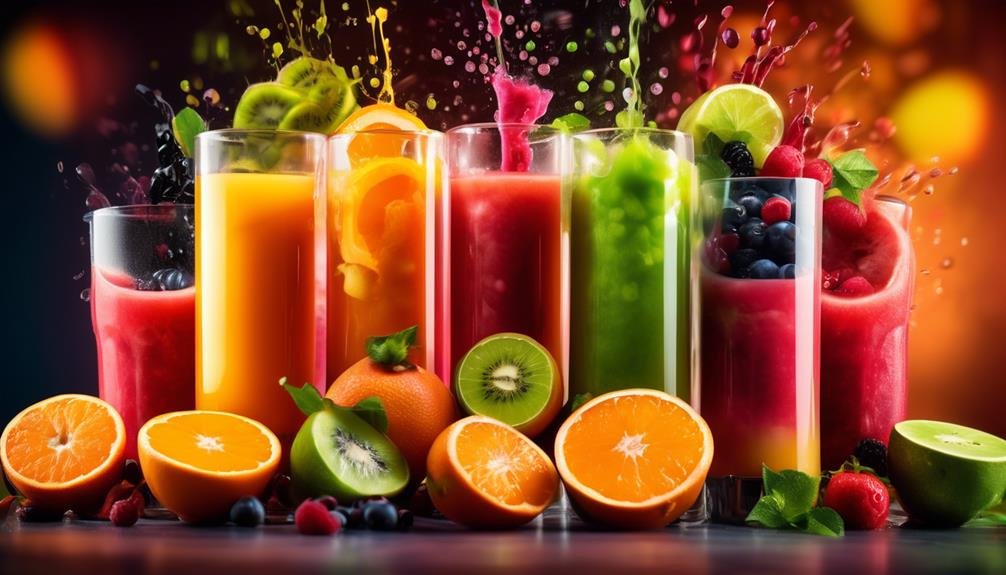Juices: Good or Bad?
Are juices a fruitful addition to your diet, or do they leave a sour taste in your mouth? When it comes to this popular beverage, opinions are divided.
On one hand, juices offer a convenient way to consume essential vitamins and minerals. They are packed with nutrients that can be beneficial for your health. Juices can provide a quick and easy source of vitamins like vitamin C and minerals like potassium. These nutrients are important for maintaining a strong immune system and supporting various bodily functions.
On the other hand, juices can be loaded with added sugars and lack the fiber found in whole fruits. Many commercially available juices contain high amounts of added sugars, which can contribute to weight gain and increase the risk of developing chronic conditions like diabetes and heart disease. Moreover, when fruits are juiced, the natural fiber is often removed, which can lead to a spike in blood sugar levels and leave you feeling less satisfied compared to consuming whole fruits.
So, is drinking juices good or bad for you? The answer lies in the nutritional content, potential health benefits, and risks associated with juices. It's important to consider the specific juice you are consuming, as well as your overall diet and health goals.
In conclusion, while juices can offer a convenient way to consume important vitamins and minerals, they can also be high in added sugars and lack the fiber found in whole fruits. Moderation and choosing juices with no added sugars or opting for whole fruits whenever possible are key. It's always a good idea to consult with a healthcare professional or registered dietitian for personalized advice on incorporating juices into your diet.
Key Takeaways
- Juices can vary in nutritional content and should not be used as long-term weight loss solutions.
- Juice cleanses and fasting may lead to nutrient deficiencies and weakened immune system.
- Some juices can cause a rapid increase in blood sugar levels, so it is important to choose low-sugar and high-fiber options.
- Juices can be a convenient and nutritious way to control appetite, promote healthy digestion, and increase fruit and vegetable intake, but should be balanced with overall dietary needs.
Nutritional Content of Juices

Juices can vary in their nutritional content, making it important to understand the differences between various types.
When it comes to juice cleanses or juice fasts, the nutritional value can vary significantly depending on the type of juice consumed. During a juice cleanse or fast, individuals often consume only fruit or vegetable juices for a certain period of time. These juices are typically made by extracting the liquid from the fruits or vegetables, leaving behind the fiber and pulp.
While this process may result in a juice that's rich in vitamins, minerals, and antioxidants, it also removes the natural fiber content. Fiber is an essential component of a healthy diet as it aids in digestion, promotes satiety, and helps regulate blood sugar levels.
Therefore, it's important to note that juice cleanses or fasts shouldn't be used as a long-term solution for weight loss or as a replacement for a balanced diet. While they can provide a temporary boost of nutrients, they lack the necessary fiber and protein needed for overall health and well-being.
To ensure you're getting the most nutritional benefit from your juices, it's recommended to incorporate a variety of fruits and vegetables into your diet. This will help provide a balance of vitamins, minerals, and fiber that are essential for optimal health.
Impact of Juices on Blood Sugar Levels
Consuming certain types of juices can have an impact on your blood sugar levels. When it comes to juices, it's important to consider their impact on insulin levels and effects on weight gain.
Juices that are high in sugar, such as fruit juices and sweetened vegetable juices, can cause a rapid increase in blood sugar levels. This spike triggers the release of insulin, a hormone that helps regulate blood sugar. However, excessive consumption of sugary juices can lead to insulin resistance, which can increase the risk of developing type 2 diabetes.
To maintain stable blood sugar levels, it's recommended to choose juices that are low in sugar and high in fiber. Vegetable juices, especially those made from non-starchy vegetables like kale, spinach, and cucumber, are a better option as they contain fewer carbohydrates and have a lower impact on blood sugar levels. Additionally, adding protein or healthy fats to your juice can further slow down the absorption of sugars, preventing sharp spikes in blood sugar.
It's important to note that while juices can impact blood sugar levels, the overall effect on weight gain depends on various factors such as calorie intake and physical activity. Consuming excessive amounts of sugary juices without considering the overall calorie balance can contribute to weight gain. Therefore, it's advisable to consume juices in moderation and consider their impact on both blood sugar levels and overall calorie intake.
Potential Health Benefits of Drinking Juices

Drinking juices can provide a variety of potential health benefits for your body. Juices are not only refreshing and delicious but also packed with essential vitamins, minerals, and antioxidants that can support your overall well-being. Let's explore some of the potential health benefits of drinking juices:
| Potential Weight Loss Benefits | Effects on Digestive Health | Antioxidant Boost |
|---|---|---|
| Can help control appetite and reduce calorie intake | Rich in dietary fiber, promoting healthy digestion | Protect against oxidative stress and inflammation |
When it comes to potential weight loss benefits, certain juices can be a valuable addition to your diet. They can help control your appetite, making you feel fuller for longer and reducing the chances of overeating. Additionally, juices that are low in calories and high in nutrients can be a great choice for those looking to shed some pounds.
Drinking juices can also have positive effects on your digestive health. Many fruits and vegetables used to make juices are rich in dietary fiber, which helps regulate bowel movements and prevent constipation. Adequate fiber intake is crucial for maintaining a healthy digestive system.
Furthermore, juices are known for their antioxidant properties. Antioxidants help protect your body against oxidative stress and inflammation, which can contribute to chronic diseases such as heart disease, diabetes, and certain types of cancer. Including antioxidant-rich juices in your diet can provide an extra boost to your immune system and overall health.
Potential Risks Associated With Juices
While there are potential health benefits to drinking juices, it's important to be aware of the potential risks associated with their consumption. One popular trend that involves the consumption of juices is juice fasting or juice cleanses. However, it's crucial to understand the potential dangers associated with these practices.
Juice fasting involves consuming only juices for a specific period, typically to detoxify the body or lose weight. However, this practice can lead to several risks. Firstly, juice fasting may not provide all the essential nutrients your body needs, such as protein and healthy fats. This can lead to nutrient deficiencies and a weakened immune system. Additionally, juice fasting can cause fluctuations in blood sugar levels, leading to dizziness, fatigue, and even fainting.
Furthermore, juice cleanses can also pose risks to certain individuals. People with diabetes or kidney problems should exercise caution when considering juice cleanses, as the high sugar content in juices can cause blood sugar imbalances and put strain on the kidneys.
Tips for Incorporating Juices Into a Balanced Diet

To incorporate juices into a balanced diet, it's important to consider portion sizes and choose options that are low in added sugars. Here are some tips to help you enjoy juices as part of a healthy eating plan:
- Experiment with juice recipes: Instead of relying solely on store-bought juices, try making your own at home. This way, you have control over the ingredients and can ensure that they're fresh and nutritious. Look for recipes that incorporate a variety of fruits and vegetables to maximize the health benefits.
- Include juices as a snack or meal replacement: Instead of reaching for unhealthy snacks, consider having a small glass of juice. It can provide a burst of vitamins and minerals to keep you satisfied between meals. For those looking to lose weight, replacing a meal with a nutrient-rich juice can be a convenient option.
- Dilute juices with water: If you find that juices are too sweet or calorie-dense, try diluting them with water. This helps to reduce the sugar and calorie content while still enjoying the flavors.
- Limit juice consumption: While juices can be a healthy addition to your diet, it's important to remember that they shouldn't replace whole fruits and vegetables. Aim to consume juice in moderation and prioritize whole foods for their fiber and other essential nutrients.
Frequently Asked Questions
Can Drinking Juices Replace the Need for Consuming Fruits and Vegetables?
Drinking juices may seem like a convenient way to get your fruits and veggies, but can they replace the real thing? Let's explore the nutritional value of juices compared to whole fruits and the impact of processing on their nutrients.
Can Drinking Juices Lead to Weight Gain?
Drinking juices can lead to weight gain because they are often high in sugar and calories. In fact, studies have shown that regularly consuming sugary drinks like juices increases the risk of developing diabetes. Additionally, the high sugar content in juices can also negatively impact dental health.
Are All Types of Juices Equally Beneficial for Health?
When it comes to juice selection, it's important to consider the nutritional value. Not all types of juices are equally beneficial for health. Some may be high in added sugars, while others may be packed with essential vitamins and minerals.
Can Juices Help in Detoxifying the Body?
Juice cleanse: Effective or just a fad? Processed juices' impact on overall health. Can juices help in detoxifying the body? They may contribute to hydration and nutrient intake, but detox claims lack scientific evidence.
Can Drinking Juices Improve Skin Health?
Drinking juices can improve skin health. Juice cleanses work by providing essential vitamins and antioxidants that promote a healthy complexion. Additionally, juice is a good source of hydration, keeping your skin hydrated and glowing.
Conclusion
In conclusion, juices can be a part of a balanced diet, but moderation is key. While they offer nutritional benefits and can be a convenient way to increase fruit and vegetable intake, they can also lead to spikes in blood sugar levels.
It's important to choose 100% fruit or vegetable juices without added sugars and to consume them in moderation. Remember, variety is key to a healthy diet and juices shouldn't replace whole fruits and vegetables.







